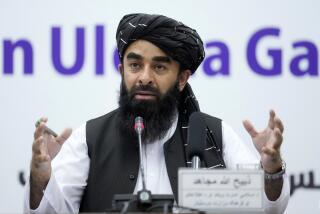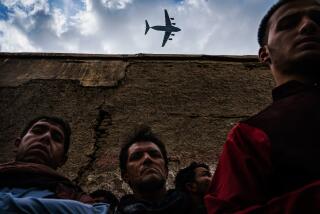Obama’s Afghan challenge
For Barack Obama, Iraq is the bad war and Afghanistan the good war. The president-elect has promised to cut back our involvement in the former and wage the latter with vigor, committing more troops and money. Paradoxically, Obama’s solution for Afghanistan could worsen its problems.
The 31,000 American troops currently in Afghanistan are already being supplemented with others from Iraq, and if Obama implements the plans he has outlined, the total could double within 18 months. But additional soldiers are unlikely to help create a stable government, curb the drug trade or reduce corruption.
During the first six months of 2008, the number of NATO and U.S. troops in Afghanistan nearly doubled. But as the military presence of the U.S. and its allies has increased, the Taliban has begun launching larger, more frequent attacks, particularly in the provinces of Kandahar, Helmand and Oruzgan. Taliban fighters have taken heavy losses, but they’ve shown great resilience. Moreover, they have moved beyond these southern bastions and established themselves in most of the country. Kabul has become more dangerous, and the Taliban operates with impunity in the adjacent provinces of Wardak and Logar.
Poppy cultivation too has continued to rise despite the increased troop presence. Afghanistan now supplies 92% of the world’s opium, a steady source of cash for the Taliban. Local governments are more corrupt and less efficient than before the troop surges began.
Obama’s advisors know that the war is going badly and that simply increasing troop levels further won’t be enough. Indeed, they admit that the insurgency cannot be crushed militarily and hint at talks with “moderate” Taliban. But they also believe that there must first be a change in the military situation; that’s why they want more firepower.
That sounds reasonable, but history suggests otherwise. As the British found during the 19th century, and as the Russians found at the end of the 20th century, military victory in Afghanistan can be elusive. The population is notoriously hostile to outside intervention, and even apparent success often produces a backlash that undoes progress.
Given that adding troops has not produced better results so far, Obama needs to have a plan for what happens if additional increments fail to have much effect and lead the Taliban’s die-hards to believe that the momentum favors them. Would he then send still more troops?
The idea of splitting the Taliban by peeling off moderates and their allies is certainly attractive. The U.S. also would like to negotiate with Afghan warriors led by non-Taliban elements, including forces of Gulbuddin Hekmatyar and Jalaluddin Haqqani, both fundamentalists whom the U.S. and Pakistani intelligence services backed during the anti-Soviet war. Yet none of these groups has been inclined to negotiate so far, and there is little to suggest they will do so in the future. As for the drug lords and criminal gangs, the war has made them rich. Why end a good thing?
American and NATO officials point to gains: the relative peace in once war-ravaged Kabul, rapid economic growth, new construction and rising school enrollments. The question is whether these achievements can be sustained and expanded amid the increasing violence. American and NATO officials say they can, and that’s another reason for more troops. But how long can the U.S. and a few allies carry the burden, especially when other alliance members refuse to provide troops to fight the Taliban despite desperate appeals, and seem less inclined to reconsider as the Taliban gets stronger?
Another downside to adding troops is that NATO’s air and ground attacks on the Taliban have repeatedly -- though accidentally -- killed civilians, incensing Afghans, including President Hamid Karzai. Taliban leaders revel in these deaths, which enable them to pose as defenders of faith and nation and to portray Karzai as the occupiers’ puppet.
And it’s not just military solutions that will prove difficult in Afghanistan. While many argue that improving the lives of Afghans through aid programs would help marginalize the Taliban, this hasn’t proved true. In fact, development projects have provided the Taliban with more targets to strike and more hostages to take.
The Obama administration will need to understand that the road to success in Afghanistan starts in Pakistan. As long as the Taliban can count on havens, supply centers and training camps in tribal areas across the border, it will continue to fight. Its aim is not so much to win as it is to endure until support for the war erodes within NATO.
The commonplace assumption -- one shared by Obama’s team -- is that Pakistan’s government can be goaded into going after the Taliban. But there is little to support that hope. The U.S. has been working with Pakistan for years to eradicate Taliban support along the border, with little to show for it. In a sobering discovery, the Government Accountability Office recently found that $2 billion of the American aid that Pakistan received for counterinsurgency since 9/11 remains unaccounted for.
Pakistan’s army and intelligence services are likely to continue doing what they have been doing: assuring Washington that they have the will and wherewithal to get serious, and launching ineffectual operations intended to keep American hopes alive.
Much is expected from Pakistan’s newly elected president, Asif Ali Zardari. It’s premature to pass judgment (he took office only in September), but the record of elected Pakistani governments in bending the military and the intelligence agencies to their will is hardly inspiring
As Pakistan’s security establishment sees it, the influence it amassed in Afghanistan up to 9/11 is in jeopardy. The Karzai government, deeply suspicious of Pakistan, is close to India, which has reestablished itself in Afghanistan, providing economic aid and helping build roads designed to reduce Afghanistan’s dependence on Pakistan. Worse, the United States favors India’s efforts.
But Pakistan’s Inter-Services Intelligence agency holds an ace. It knows that the United States cannot abandon Pakistan as long as Al Qaeda and the Taliban dwell in the tribal areas adjoining Afghanistan.
Obama has no good choices in Afghanistan. Expect the good war to be a long and costly one.
Rajan Menon is a professor of international relations at Lehigh University and a fellow at the New America Foundation. He is the author of “The End of Alliances.”
More to Read
A cure for the common opinion
Get thought-provoking perspectives with our weekly newsletter.
You may occasionally receive promotional content from the Los Angeles Times.






